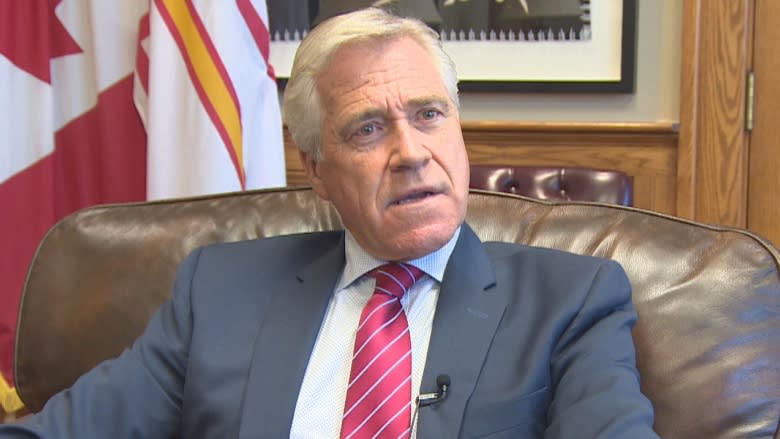No carbon tax for N.L. if other provinces don't have one, says Ball
If Ontario and Saskatchewan's court challenge of the federal government's right to impose a carbon tax on provinces is successful, Newfoundland and Labrador won't implement a tax of its own, says Premier Dwight Ball.
"At no point would we ever expose Newfoundlanders and Labradorians to a carbon tax if there is not a federal carbon pricing in other provinces," Ball said.
"We will never put Newfoundlanders and Labradorians exposed to a carbon tax unless you are seeing other provinces exposed to the federal backstop (imposed tax) or their own plan."
Federal plan imposes pricing next year
The federal government has introduced legislation to impose a federal carbon pricing plan on Jan. 1, 2019, on provinces that haven't proposed an alternative carbon tax of their own.
With the deadline approaching, Newfoundland and Labrador is preparing to propose its own carbon pricing plan to the federal government this fall, Ball said.
"We are about to make our submission in early September to the feds based on what is a Newfoundland and Labrador approach to greenhouse gas emissions," he said.
"It makes provisions for industry, economic development — especially offshore in our province, which is key to our future. Less impact on our offshore, and any price on carbon would stay right here in this province."
He said this province's plan must take into its economy into account.
"A simple carbon tax is very restrictive on economic development. It has a significant impact on Newfoundlanders and Labradorians," said Ball.
Similar to Alberta carbon pricing
Ball says this province is preparing to propose a carbon-pricing plan this fall that is similar to what is already done in Alberta.
"We are very close to where the Alberta hybrid would be, which allows for especially oil companies and heavy industry to actually continue to grow and create jobs in our province, but yet recognizes that we all have a role to play in greenhouse gas emissions," said Ball.
Alberta introduced a $20-per-tonne tax on carbon dioxide emissions Jan. 1, 2017, which increased to $30 a tonne on Jan. 1, 2018. It's set to go up to $50 a tonne by 2022.
That means that in Alberta the carbon tax on gasoline increased from 4.49 cents per litre in 2017 to 6.73 cents per litre in 2018. On a litre of diesel, it increased from 5.35 cents to 8.03 cents.
Ball says if Newfoundland and Labrador adopts a plan like Alberta's, any price increase on gasoline in January 2019 would be offset by a reduction in the provincial tax.
"So a litre of gasoline in our province in 2019, there would be no change to where we are today in terms of taxation," he said.
Read more from CBC Newfoundland and Labrador


